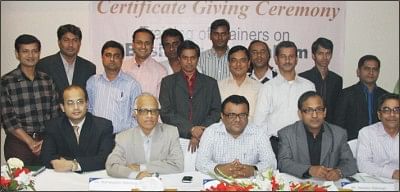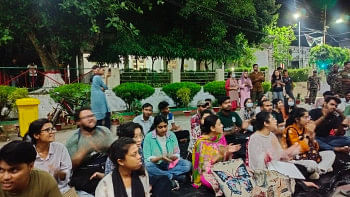Business journalism in focus

Dr Wahiduddin Mahmud (2-L, seated), professor of economics at Dhaka University, poses with participants of Training of Trainers on business journalism at a 'certificate giving ceremony' organised by Management and Resources Development Initiative (MRDI) at Dhaka Sheraton Hotel yesterday. (From right, seated) Farid Hossain, bureau chief of AP, Hasibur Rahman, executive director of MRDI, Syed Ishtiaque Reza, chief of news for Baishakhi TV, and Shahroz Jalil, director for Services Group of Katalyst, are also seen.Photo: STAR
Economist Prof Wahiduddin Mahmud said business and economic journalists must have clear knowledge of the subject they write on and remain alert to filter out misconceptions. He asked the journalists to clearly explain jargons to readers.
Wahiduddin was addressing a certificate giving ceremony to the journalists who received training of trainers (ToT), at Dhaka Sheraton Hotel.
Management and Resources Development Initiative (MRDI) organised the training programme in association with Katalyst, a market development project.
Wahiduddin said business and economic journalism is gaining momentum both in quality and area in Bangladesh. The economist said the development of business journalism was a "big achievement".
He however advised journalists to learn more and use numbers and statistics with a sense of proportion and avoid confusion of data and information.
Citing an example, he said if Tk 7,000 crore was being spent on an elevated expressway, it will make more sense if a reporter expresses the figure as a percentage of the annual development outlay or gross domestic product.
Wahiduddin, also a former adviser to caretaker government, asked business journalists to understand nominal and real GDP and its growth to avoid misconceptions.
Nominal GDP measures the value of all the produced goods and services in current prices. On the other hand, real GDP -- calculated in constant prices -- measures the value of output by adjusting for inflation.
Farid Hossain, bureau chief of The Associated Press and the course facilitator for the training programme, and Shahroz Jalil, director (services group) of Katalyst, also spoke.
Syed Ishtiaque Reza, head of news of Boishakhi TV and a director of MRDI, moderated the function.
For the first time in Bangladesh, 15 business journalists of print and electronic media were developed as trainers. They were given a weeklong residential training in Savar in August and a three-day follow-up training in January.
Martin Mulligan, a senior journalist in the Financial Times, UK, and Robert Powell, financial journalist at BBC World Service Trust, were the core trainers of the programme.

 For all latest news, follow The Daily Star's Google News channel.
For all latest news, follow The Daily Star's Google News channel. 



Comments